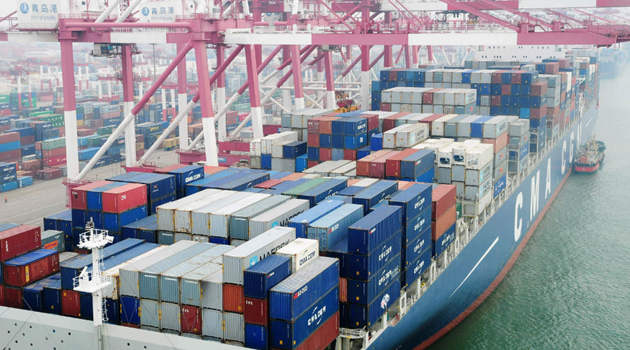The figures are potentially another cause for concern about the the economy, which has shown signs of weakness recently with a string of disappointing indicators on trade, industrial output and consumer spending.
Imports slumped 11.3 percent year-on-year to $162.4 billion while exports fell 6.6 percent to $170.1 billion, the General Administration of Customs announced, resulting in a surplus of $7.7 billion. China recorded a surprise deficit of $884 million in March last year.
The results confounded market expectations, which had been for growth of 4.2 percent in exports and 2.8 percent in imports, according to the median forecasts in a survey of 16 economists by Dow Jones Newswires.
China recorded an unexpected trade deficit of almost $23 billion in February, which authorities blamed on the Chinese New Year holiday season. That result was China’s first monthly deficit in 11 months.
“Currently our foreign trade indeed is having some difficulties,” Customs spokesman Zheng Yuesheng said in a statement.
“China’s foreign trade has seen its competitive advantages in traditional trade being eclipsed due to negative factors including rising competition posed by neighbouring countries and regions and increasing trade friction with major trade partners.”
But Zheng urged calm, saying the setback will be “temporary and short-lived” and adding: “We cannot jump to the conclusion that our foreign trade is having a recession.”
– Import growth to stay weak –
For the first three months of 2014, China recorded a trade surplus of $16.7 billion — down sharply from $43.1 billion the year before — as exports fell 3.4 percent to $491.3 billion and imports rose 1.6 percent to $474.6 billion, the figures showed.
Analysts cautioned that the latest trade figures continued to be affected by fake reporting of exports seen early last year.
“We believe that China’s trade growth in the first few months would be distorted as the export over-invoicing activities last year have inflated the base for comparison,” ANZ Bank economists Liu Li-Gang and Zhou Hao said in a research note.
Import growth, however, was expected to remain a problem.
“At first glance, the weakness appears to be broad based, with both imports for processing and re-export and imports for domestic use contracting year-on-year,” Julian Evans-Pritchard, China economist at Capital Economics, said in a note.
Growth in imports was expected to “remain relatively weak as slowing investment spending is likely to weigh on imports of commodities and capital goods”, he added.
“As a result, China’s trade surplus is likely to rebound further over the coming year.”
Premier Li Keqiang on Thursday expressed confidence authorities can steer the economy through any troubles.
“With all the principles established and policy options at our disposal, we can handle all possible risks and challenges,” Li said, according to the state-run Xinhua news agency.
But despite those tools, Li also discounted any expectations for significant pump-priming even after some limited measures were announced last week.
“We will not resort to short-term stimulus policies just because of temporary economic fluctuations and we will pay more attention to sound development in the medium and long run,” he said. His comments came at the annual Boao Forum for Asia, a gathering of Chinese and international political and business leaders on the southern island of Hainan.
Li last week chaired a meeting of the State Council, China’s cabinet, where steps including extending tax breaks for small businesses and support measures for poor urban districts were announced in what analysts saw as a “mini stimulus”.
China’s leadership says it wants to make private demand the key driver for the country’s economic growth, moving away from over-reliance on huge and often wasteful investment projects.
Though expecting such a transformation to cause slower growth, they see that as healthier and more sustainable in the long run.



































